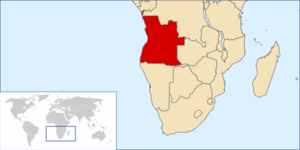Welcome to the Virtual Education Wiki ~ Open Education Wiki
Angola: Difference between revisions
| Line 93: | Line 93: | ||
# ICT in education in Angola, infoDev, 2007, http://www.infodev.org/en/Publication.385.html | # ICT in education in Angola, infoDev, 2007, http://www.infodev.org/en/Publication.385.html | ||
# http://www.uab.pt | |||
# http://www.opais.net/pt/dossier/?det=12107&id=2025 | |||
# http://ensinoangola.com/category/ensino-a-distancia/ | |||
# http://www.catolicavirtual.br/ | |||
# http://poloangola.blogspot.com/2009/05/laboratorio-de-informatica-do-polo.html | |||
# http://ensinoangola.com/2010/06/21/ensino-a-distancia/ | |||
# http://www.unesp.br/nead/noticia.php?artigo=6085 | |||
Revision as of 18:53, 29 September 2011
Partners situated in Angola
None.
Angola in a nutshell
Angola, officially the Republic of Angola (Portuguese: República de Angola, Kongo: Repubilika ya Ngola), is a country in south-central Africa bordering Namibia to the south, Democratic Republic of the Congo to the north, and Zambia to the east, and with a west coast along the Atlantic Ocean. The exclave province Cabinda has a border with the Republic of the Congo and the Democratic Republic of the Congo.
The official language is Portuguese.
(sourced from http://en.wikipedia.org/wiki/Angola)
Angola education policy
Angola education system
(sourced from http://en.wikipedia.org/wiki/Education_in_Angola)
Education in Angola has four years of compulsory, free primary education which began at age seven, and secondary education which began at age eleven, lasting eight years. Basic adult literacy continues to be extremely low, but there are conflicting figures from government and other sources. It is difficult to assess not only literacy but also other educational needs. Statistics available in 2001 from UNICEF estimate adult literacy to be 56 percent for males and 29 percent for women.
Higher education
Universities in Angola
These include:
- University of Agostinho Neto, a large public university in Luanda and Huambo
- Independent University of Angola (Universidade Independente de Angola), a private university based in Luanda
- Catholic University of Angola, a small private university based in Luanda
- Lusiada University, a small private Portuguese university with a campuses in Luanda, Benguela and Cabinda, Angola
- Jean Piaget University of Angola, a small private university based in Luanda and Benguela (province)
Polytechnics in Angola
Higher education reform
The Bologna Process
Administration and finance
Quality assurance
Angola's HEIs in the information society
There is a report from infoDev at http://www.infodev.org/en/Publication.385.html
Towards the information society
Information society strategy
Virtual Campuses in HE
Interesting Virtual Campus Initiatives
- UCB Virtual Pólo Angola is a department of the Universidade Católica de Brasília located in Brasilia, Brazil. UCB Virtual offers 16 Graduate Courses, 27 Post Grad Courses and 15 Short Courses available in Brazil, Japan, Angola and USA. In Angola, UCB Virtual works in partnership with [Escola Católica Dom Bosco in Luanda. Its main objective is to help the lower class population to continue with their studies. Examples of short courses available: Entrepreneurship, Tutor training, Instrumental English, Tourism Marketing, Public administration of tourism amongst others. UCB Virtual Pólo Angola web site is at <http://www.catolicavirtual.br>
- UAN-CEAD Centro de Ensino à Distância da Universidade Agostinho Neto (Distance Learning Center - Agostinho Neto University. The UAN-CEAD is the distance learning department at the University Agostinho Neto located in Luanda, Angola. UAN-CEAD is integrated in the Lusophone Network, which aims to boost the global dissemination of training content in Portuguese and sharing of best practices among development institutions in the Portuguese Speaking Countries. UAN-CEAD website is at http://www.cead-uan.com
- NEaD - Núcleo de Educação a Distância da UNESP The Distance Learning Center of the Universidade Estadual Paulista Julio de Mesquita Filho is located in São Paulo, Brazil. NEAD provides a framework to support academic courses, helping to keep the quality and credibility of University. Courses are available in the form of in the form of extension courses, undergraduate or postgraduate level and are available to students from Mozambique, Angola, Cape Verde, Guinea Bissau and Sao Tome and Principe. UNESP website is at http://www.unesp.br/
- FORMEDIA is a management development centre located in Lisbon, Portugal. FORMEDIA is specialized in management and entrepreneurship education, with onsite, online and blended learning. Established in 1988, they have regular activities in Portuguese-Speaking Countries, especially in Portugal, Angola, Brazil, Cape Verde and Mozambique. FORMEDIA website is at http://www.formedia.pt/
Interesting Programmes
- CyaBite is a school of IT and Computer Science located in São Paulo, Brazil. Since 1988 CyaBite has been training thousands of students, initially in their units in São Paulo and more recently through distance learning. Vocational courses offered include Professional Administrative Assistant, Typing Course, Graphic Design, Web Design, Secretarial Course amongst others. CyaBite can be accessed by students in all Brazilian States, as well as students living in Portugal, Angola, Cabo Verde, Guinea-Bissau, Moçambique, Sao Tome and Principe, East Timor as well as Macau in China. CyaBite web site is at <http://www.ciabyte.com.br>
- Imaginologia provides on line courses with emphasis in the medical field. The website aims provide further training to the medical community of the Portuguese language (Brazil, Angola, Portugal, Cape Verde, Mozambique, Sao Tome and Principe, Guinea-Bissau and East Timor. Imaginologia web site is at <http://www.imaginologia.com.br/cursos-a-distancia.asp>
- ACABA - Academia Aberta de Angola (Open Academy of Angola) operates in Angola and concentrates in providing training and developing courses using Information and Communication Technology (ICT). ACABA works in partnership with Angolan and foreign institutions and offers Undergraduate – Postgraduate – Masters degrees, as well as short vocational courses as Research methodology, practice of teaching Portuguese language, formation of e-tutors, lesson preparation and writing of educational records amongst others. ACABA website is at http://www.academia-aberta.com
Re.ViCa Case-study
Lessons learnt
None.
References
Wikipedia
Others
- ICT in education in Angola, infoDev, 2007, http://www.infodev.org/en/Publication.385.html
- http://www.uab.pt
- http://www.opais.net/pt/dossier/?det=12107&id=2025
- http://ensinoangola.com/category/ensino-a-distancia/
- http://www.catolicavirtual.br/
- http://poloangola.blogspot.com/2009/05/laboratorio-de-informatica-do-polo.html
- http://ensinoangola.com/2010/06/21/ensino-a-distancia/
- http://www.unesp.br/nead/noticia.php?artigo=6085
